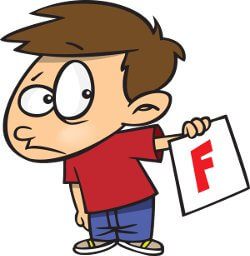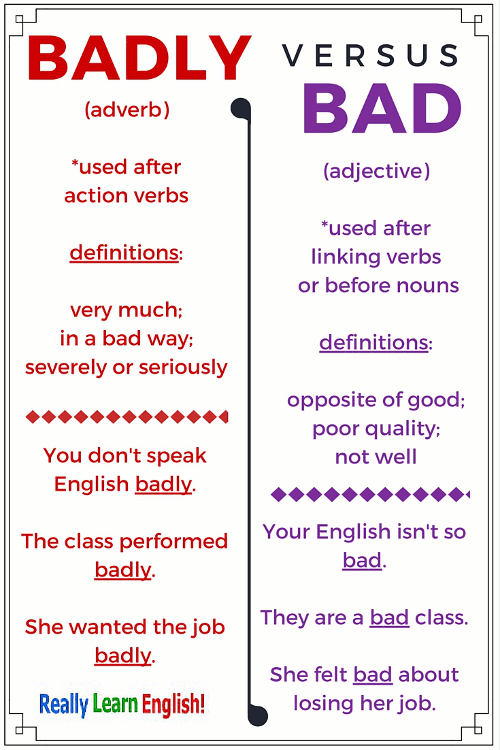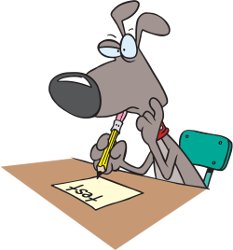Bad vs. Badly
What is the
difference?
There are many pairs of confusing words in English. Bad and badly are two commonly confused words in the English language. When and how do you use each one?
Click Here for Step-by-Step Rules, Stories and Exercises to Practice All English Tenses
Bad
Bad is an adjective. An adjective is a word that describes a person, place, or thing.Definitions of bad:
- opposite of good
- poor quality
- not healthy, or painful
- the verb "to be" (am, is, was, were, are)
- seem
- feel
- become
- appear
- The house is in bad condition after the fire.
- This seems like a bad book.
- Your English isn't so bad.
- He will become a bad dog if you don't train him.
- It was a bad report card.
- Her health is pretty bad.
- I have a bad back.
- The children performed bad on the worksheet.
- You don't speak English bad.
- Nick sings bad.
- The painter paints bad.

It is a bad report card.
He performed badly on the test.
Badly
Badly is an
adverb.
Adverbs describe actions.Definitions of badly:
- in a bad way
- very much
- severely or seriously
These sentences are correct:
- We played badly and lost the game.
- She sang badly.
- She wanted the job badly.
- Was John hurt badly in the accident?
- The table was badly damaged.
- He spoke badly French.
- I had a dream badly.
- It was badly news.
- He looks badly
after the fight.
Take the quiz!
Action verb or linking verb?
Is it an action
verb or a linking
verb? Some verbs can be used as action verbs and linking
verbs in different sentences.
Action
verbs are usually easier to use and understand. Action verbs
show activity or movement.
- Example: I kick the ball.
In this example, the action verb is kick. Kick is a movement.
Linking
verbs connect the subject of the sentence to information
about that subject.
- Example: I am happy.
In this example, the linking verb is am. Am connects the subject (I) to information about the subject (happy). Am is a "to be" verb.
Verbs that deal with the senses are sometimes used as action verbs and sometimes used as linking verbs. (senses = taste, touch, smell, hear, see)
Remember:
If a verb is used to describe an action, it is an
action
verb.
If a verb is used to describe a feeling, it is a linking
verb.
Here are a few verbs that can be used as action verbs and linking verbs.
| Action Verb |
Linking Verb |
|
| feel | to
touch something; to be aware of something physically (pain, heat, an object) I felt the soft pillow. He feels pain from his sunburn. |
used to
describe or ask about someone's physical or mental state Do you feel ok? I feel sad today. |
| smell | to
use your nose to smell something I smelled the flower. Did you smell the smoke from the fire? |
to have an odor The garbage smells.
The refrigerator smells like
apples.
|
| taste | to
sense a flavor of food or drink I taste garlic in the sauce. I tasted the coffee and put more sugar in it. |
to
have a certain taste The milk tastes sour. The apples taste sweet. |
| look | to
use your eyes to see something The teacher looked at me. I looked at the painting. |
to
seem to be something He looks angry. He looks like he is hurt. |
| appear | to become visible; to arrive The stars appeared in the night sky. The cat appears at our house every morning. |
to seem to be something;
to have a certain characteristic She appears angry. He appears to be hurt. |
Let's practice!
Now, it is your turn to try! Complete each sentence by choosing bad or badly. Then, scroll below the pictures for the correct answers.2. He ran bad/badly in the race.
3. Things looked bad/badly for the football team.
4. This is a bad/badly movie.
5. You don't speak English bad/badly.
6. He drove bad/badly and caused an accident.
7. Please don't feel bad/badly about forgetting to call.
8. His face was bad/badly bruised.
9. He treated me bad/badly .
10. The music sounds bad/badly.
Scroll down past the graphic to see the answers!

Answers:
2. He ran badly in the race.
3. Things looked bad for the football team.
4. This is a bad movie.
5. You don't speak English badly.
6. He drove badly and caused an accident.
7. Please don't feel bad about forgetting to call.
8. His face was badly bruised.
9. He treated me badly.
10. The music sounds bad.
Return to Action Verb or Linking Verb
Get Updates, Special Offers, and English Resources
Download your FREE GIFT (the first two chapters of
English Short Stories Book and Workbook)
as soon as you join!

By submitting your email, you consent to receiving updates and newsletters from us and to the sharing of your personal data with third parties for the purposes of sending you communications. We will not spam you. You can unsubscribe at any time. For more information, please see our privacy policy.






